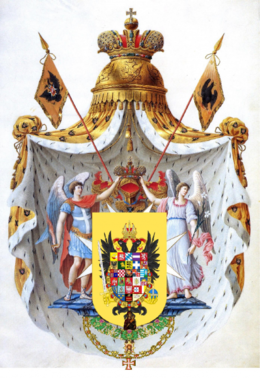John VII of Diadochia
John VII of Diadochia or John Basil Flavius Heraclius Valerius Aurelius Michael Konstantinos Adam Augustus(Greek: Ιωάννη Βασίλειος Φλάβιος Βαλέριος Αυρήλιος Ηράκλειος Κωνσταντίνος Μιχαήλ Αδάμ Αύγουστος; 9 March 1757 – 17 April 1802) was Holy Diadochian Emperor from 1796 to 1802. He was the eldest son of Empress Zoe II of Diadochia and her husband, Nikolas-Alexander of Lusitania.
Contents
Early Life
John was born in 1757 to Empress Zoe II of Diadochia and her husband Prince Nikolas-Alexander of Lusitania. John's education included lessons on administration, various languages of the multiethnic empire, mathematics, among others.
Marriages
John married Princess Maria Amelia in 1771, when he was fourteen. The couple lived happily together for a few months, until Maria died in childbirth a few months later. John was in no hurry to remarry but his mother the Empress insisted and a list of all the elgible princesses of all the royal houses of Esquarium was created. After months of searching John set his sights on Sophia Dorothea of Galicia. The marriage was favored by the Imperial Court for several reasons, (1) The Princess was of the Greek Orthodox Faith, (2) The Kingdom of Galicia was technicly a constituent part of Diadochia thus removing the threat of a foreign nation dragging the empire into foreign wars, (3) The Galician princess was the Crown Prince's second cousin.
John and Sophia Dorothea were officially married in 1772. By early March the Princess Sophia Dorothea was given the title Byzantiná, the traditional title of the wife of the (Byzantinoú) heir apparent of Diadochia. The couple's first child was born that samae year.
- 1780Fête for John VII and Sophia Dorothea of Galicia.jpg
Fête Organized to Celebrate the Marriage of the John to Princess Sophia Dorothea of Galicia 20 January 1772.
- Wedding of John VII and Sophia Dorothea of Galicia.jpg
The Arrival of Princess Sophia Dorothea of Galicia on the Occasion of Her Wedding to Crown Prince John, Prince of Bithynia, 1772.
Reign
John VII's mother the Empress Zoe II, died on 15 November 1796 and he came to the throne as John VII at the age of 39. John VII was crowned Holy Diadochian Emperor on 7 May 1797 at the Koimíseos Cathedral in Alexandretta. Huge coronation festivities followed his coronation.
- Coronation John VII in 1797.jpg
Coronation of John VII in 1797 at Alexandretta.
- Coronation Banquet of John VII 1797.jpg
Coronation Banquet for the Holy Diadochian Emperor John VII in Alexandretta 1797.
Legal Reforms
John VII abolished serfdom in 1797. He reduced the number of censorship's being issued to 800, while his mother had issued over 6000. In 1798 following the abolition of serfdom, John VII gave full legal rights and freedoms to the former serfs. In 1798 John VII ended censorship of the theatres, and lessened censorship of the press. John VII is also remembered for lessening the death penalty for treason and other serious crimes against the state.
Religious reforms
John VII implemented many religious reforms designed to ease the religious tensions between the different faiths of the empire. He issued the Edict of Religious Tolerance in 1798, which removed restrictions against the practice of Protestant and catholic Christian religions. John VII abolished the Jewish-only taxes and lessened the anti-Semitic sentiment in the empire. John VII was also more tolerant of non-christian faiths such as Sunni Islam and Jewish.
Administrative policies
John VII issued over 10,000 new laws in the first two years of his reign. He greatly centralized the multinational empire. He sat a precedence by starting to appoint people to his government strictly based on their own merit and not class or ethnic origins.
Education
John VII made elementary education compulsory for all boys and girls. His education reforms greatly increased the literacy rate of Diadochia. In 1799 John VII officially declared the greek language the country's language of instruction. In 1800 he decreed that other regional languages would be instructed as well.
Foreign policy
During his reign John VII pursured a policy of war, expansion, colonization, and trade
Children
John VII and his second wife Sophia Dorothea Josephina of Galicia had sixteen children all together:
- Emperor Nikolas V of Diadochia (b. 1772-1822)
- Archduchess Maria Theodosia Ioannidou (b. 1779-1865)
- Archduke Constantine Ioannidis (b. 1781-1787) (died age 6)
- Achduchess Nikoleta Ioannidou (b. 1782-1806)
- Archduchess Maria Isabella Ioannidou (b. 1783-1816)
- Achduchess Alexandra Ioannidou (b. 1783-1803)
- Archduchess Zoe Christina Ioannidou (b. 1785-1858) (named after her peternal aunt)
- Archduchess Theodora Ioannidou (b. 1787-1825
- Archduchess Paula Ioannidou (b. 1789-1798) (died age 2)
- Archduchess Maria Constantina Ioannidou (b. 1791-1829)
- Archduchess Maria Irene Ioannidou (b. 1791-1865)
- Achduchess Helena Ioannidou (b.1792-1862)
- Archduke Manuel Ioannidis (b. 1792-1856)
- Archduchess Maria Amelia (b.1795-1823)
- Archduchess Maria Anna Ioannidou (b.1796-1846)
Full title
His title after accession to the imperial throne:
John, by the Grace of God, Emperor of the Romans, Emperor and Autocrat of all the Diadochias, King of the Greeks, King of Magaria, of Moesia, of Dalmatia, of Illyría, of Pannonia, of Sarmatia, of Dacia, of Iberia, of Aquitania, etc.; Archduke of Atlantida; , of Raetia, of Cyrenaica and of Petras; Grand Prince of Vlachiá; Marquess of Ravenna; Duke of Saxonía, of Florentia, of Sikeliás, of Valentia, of Baetica, of Chersonesos, of Syracuse, of Kapoua, of Sárdeis, of Paphos, of Caesarea and of Pantikápaion; Princely Count of Komne, of Cartagena, of Malágina, of Agrippina, of Noricum, and of Gorgóna.

